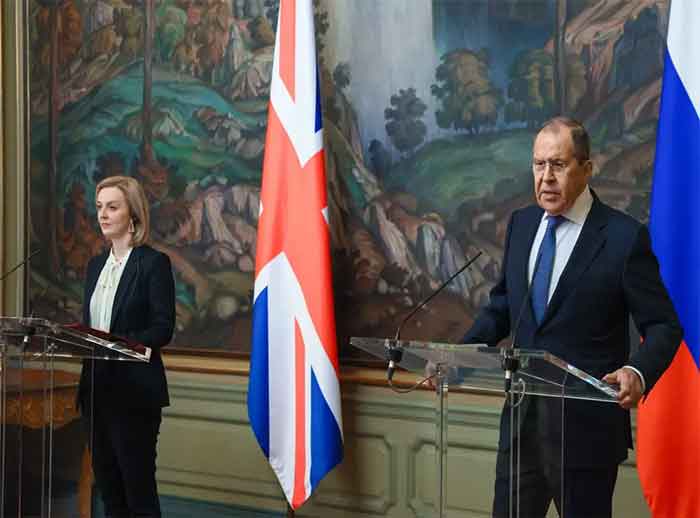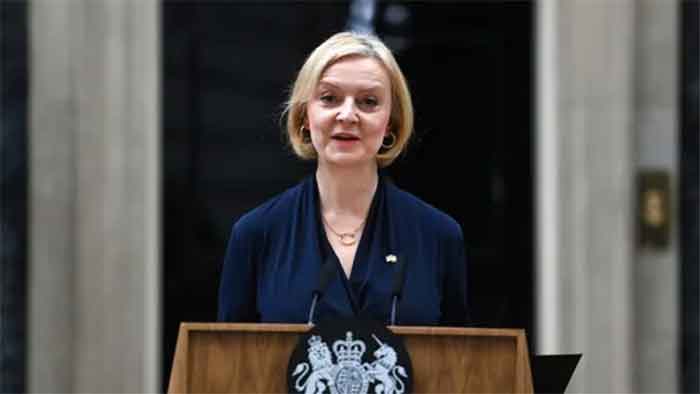
Incompetent politicians and diplomats are on the level with ill-prepared generals fighting current wars with dated methods. They err, they stumble, and they may well be responsible for the next idiotic slander, misfire or misunderstanding. UK Foreign Secretary Liz Truss is synonymous with Prime Minister Boris Johnson’s idea of groping diplomacy. Graceless, all confusion, and much ignorance besides, she has been given the task of howling in the Kremlin’s direction, warning that no invasion of Ukraine will be tolerated by Global Britain.
Truss, former international trade secretary known for her “goofy public persona”, took over from the less goofy and somewhat severe Dominic Raab as foreign secretary in Johnson’s ministerial shake-up last year. Her time at the Department of International Trade had been dubbed the “Department for Instagramming Truss”, given her insatiable appetite for social media platforms.
Ideology, not facts, interest her. As she explained to Politico, “I’m probably one of the more ideological among my colleagues, in that that’s what motivates me.” Her rapid immaturing has seen her moving ever more towards economic libertarianism, founding the Free Enterprise Group of Conservative MPs keen to savage and prune employment laws and regulations.
The placing of ideology before facts has somewhat dented her performance at critical points. In foreign relations, notably when war might be peeking around the corner between Ukraine and Russia, this is telling. During the course of the BBC’s Sunday Morning show, she claimed that “we are supplying and offering extra support into our Baltic allies across the Black Sea.”
Identifying the wrong sea enabled Russia’s foreign ministry spokesperson, the reliably stern ice queen Maria Zakharova, to move in for the kill. “The Baltic countries are called so because they are located precisely off the coast of this [Baltic] sea. Not the Black [Sea].” A grave Zakharova could only reflect that, “If anyone needs to be saved from anything, then it is the world from the stupidity and ignorance of Anglo-Saxon politicians.”
During that now notorious closed-door meeting between Truss and Russia’s Foreign Minister Sergei Lavrov in Moscow, ignorance basked gloriously, with Truss floundering with amateurish accomplishment. Truss, so goes the account, demanded of the Russian Foreign Minister that his country move its troops away from the Ukrainian border. Lavrov’s steely point was elementary: Moscow could do what it wanted to within its own borders.
Then came the grenade, pin removed. Truss, having previously been interested in trade, probably had her mine on cheese or pork products. The Foreign Secretary was asked (trap laid in full view) whether the UK recognised sovereignty over Rostov and Voronezh. According to the Kommersant newspaper, Truss was defiant: the UK would never recognise them as Russian. In the long tradition of the diplomatic corps, the UK ambassador to Moscow, Deborah Bronnert, had to aid Truss in correction. Rostov and Voronezh were, well, Russian.
This gave Lavrov much ammunition in the press conference that followed. He claimed that talking to Truss was like “speaking to a deaf person who listens but cannot hear”. Spokesman Dmitry Peskov, when asked about Truss’s limited understanding of the region and, so it went, her brief, seemed to relish it. “We are not in the position to answer this question. It’s the Foreign Ministry’s competence.”
On Sky News, Russia’s deputy ambassador to the United Nations, Dmitry Polyanskiy, was brutally direct. “There is always room for diplomacy but, frankly, we don’t trust British diplomacy. I think in recent years British diplomacy has shown that it is absolutely worthless.”
The Truss ignorance show did not go down well in those quarters that still feel Britannia has a muscular role to play in foreign affairs. Having cut his teeth as British ambassador to Moscow, Tony Brenton mourned the Truss Moscow “performance” as completing “the process of the UK making itself irrelevant to serious diplomatic efforts to resolve the Ukraine crisis.”
Former editor of the Financial Times, Lionel Barber, homed in on Lavrov as “Putin’s Gromyko”, one who ate “Liz Truss alive on camera, dismissing her as an ignorant lightweight who spends too much time on social media.”
Martin Fletcher, former foreign editor of The Times, bemoaned Truss’s lass of serious preparation and her visit to Moscow as, for the most part, “a glorified photo opportunity”. What he would have given for a harder, more disciplined engagement with the Russians, the sort that the late former British Prime Minister Margaret Thatcher was rather good at.
Some British pundits were left scrounging for nuggets of justification. James Forsyth clucked his way to suggesting that Lavrov’s rudeness was somehow a “sign that Liz Truss held the line in their meeting”. Rallying support for Truss was the gossip columnist of the Spectator, who could not stomach the “Brit-poisoning Kremlin” to any degree. “For her part, Truss stayed calm and walked off after the snub, having used her meeting to re-emphasise the British government warnings about the build up of Russian troops on the Ukrainian border.”
The problem with Truss is fundamental, having little to do with showmanship or any proud display in the face of stupidity or a basic lack of understanding. She may well be representing a power diminished, but the UK, billing itself as Global Britain, is doing poorly under her hollow, social media driven stewardship. Former Australian Prime Minister Paul Keating has even labelled her assessment of Beijing and Russian intentions (for Truss, these are inseparable) as “nothing short of demented.”
Writing for Spiked, Mary Dejevsky, having cut her teeth as Moscow correspondent for The Times between 1988 and 1992, showed her talons in explaining why the Truss adventure was, diplomatically, all fizz and utter failure. “Dispatched for little more than a day trip to Moscow, Liz Truss managed to confirm all of Russia’s negative preconceptions about British diplomacy – arrogance, coldness and an attachment to hypocritical sermonising about ‘values’ – while adding at least one more: ignorance.” Punchy stuff, and accurate to boot.
Dr. Binoy Kampmark was a Commonwealth Scholar at Selwyn College, Cambridge. He currently lectures at RMIT University. Email: [email protected]













































